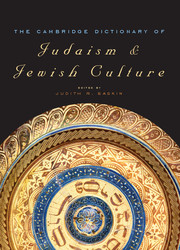Book contents
J
Published online by Cambridge University Press: 05 August 2014
Summary
Jacob (also known as Israel) is the younger son of *Isaac and *Rebekah and the father of sons who would become the eponymous founders of the *Israelite tribes. Jacob is a central character of *Genesis 25:19–35:29; he plays a smaller role in *Joseph's story, primarily with his deathbed testament (Gen 49). A subversive, trickster figure, Jacob struggles with his twin brother *Esau in their mother's womb, and God tells Rebekah that “the elder shall serve the younger”(25:23). At birth, Jacob attempts to supplant his older brother by gripping Esau's heel (Hebrew, akev, a folk etymology for ya'akov) and later dupes him into selling his birthright (Hebrew, berakhah). Rebekah helps Jacob trick his elderly father into offering him the blessing due to Esau. When a devastated Esau responds with anger, Jacob flees to Haran in *Mesopotomia. En route, Jacob encounters God in a vision of angels at a place he names *Beth El (28:10– 22). In Haran, his relationship with his uncle Laban is characterized by duplicity and struggle. Jacob seeks to marry Laban's younger daughter *Rachel, but after seven years of labor, Laban tricks Jacob by sending his older daughter *Leah into Jacob's marital tent. Jacob marries Rachel shortly thereafter, but must pay for her with another seven years of labor. Jacob has seven children with Leah, two each with his wives’ maidservants Bilhah and Zilpah, and two with Rachel after a long period of infertility.
- Type
- Chapter
- Information
- The Cambridge Dictionary of Judaism and Jewish Culture , pp. 317 - 351Publisher: Cambridge University PressPrint publication year: 2011



